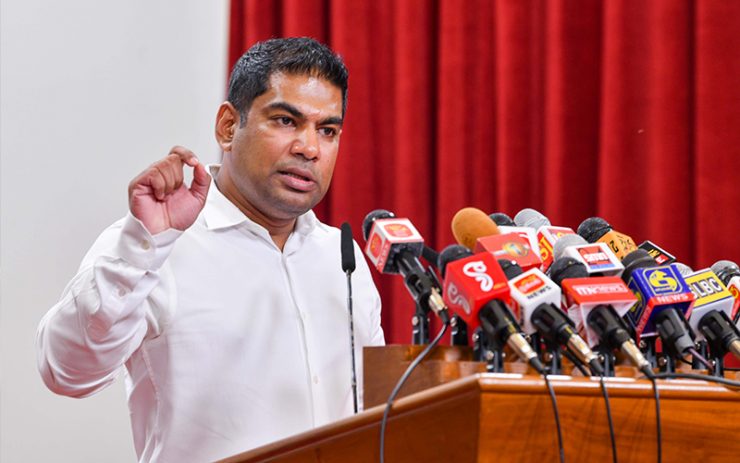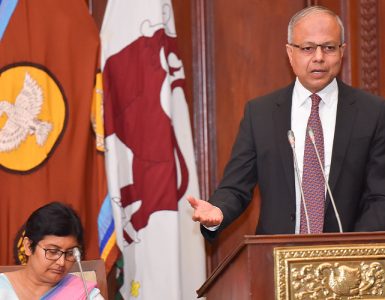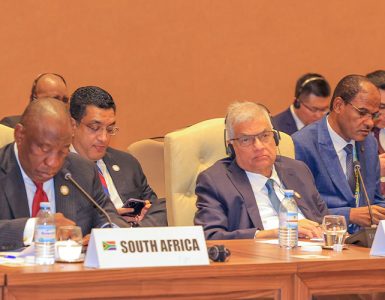- New Electricity Act to be submitted to Parliament in the next two weeks.
Minister of Power and Energy Mr. Kanchana Wijesekera, stated that in the event of the Electricity Board realizing any operating profit by December, attributed to the favourable rain conditions, a strategic decision has been made to allocate these gains to consumers in April.
Furthermore, Minister Kanchana Wijesekera highlighted that the Electricity Board is currently facing a financial deficit of Rs. 12 billion. However, given the prevailing rain conditions, it is anticipated that there may be a positive turn in the financial outlook, as indicated in the upcoming financial report of the Electricity Board in December.
Minister of Power and Energy, Mr. Kanchana Wijesekera, shared these insights during his participation in today’s (25) Press Briefing at the Presidential Media Centre (PMC), organized under the theme Collective Path to a Stable Country’.
The Minister further commented:
The restructuring of the Ceylon Electricity Board (CEB) has long been a subject of discussion within the country. In a significant development, the Cabinet granted approval last Monday for the restructuring based on the submitted report. Additionally, the proposed new electricity bill received approval, marking a crucial step towards enhancing the efficiency and effectiveness of the electricity sector in alignment with national objectives
Consequently, measures are underway to officially gazette and submit the new Electricity Act to Parliament within the upcoming two weeks. The intention is to facilitate a comprehensive debate on the proposed Act in the Parliamentary sessions scheduled for January of the following year.
The Minister addressed misconceptions raised in Parliament concerning the configuration of electricity generation, transmission and distribution. The Minister’s proposal entails restructuring power generation into four distinct companies, emphasizing that the entire hydroelectricity sector, constituting 100%, will remain under government control. The management of power plants situated in close proximity to Mahaweli, Lakshapana and Samanalaweva will also be retained by the government.
As part of this restructuring initiative, it has been decided to consolidate the Norochchole power plant under a single company, while all other power plants will be grouped together under a separate entity. This strategic decision aims to optimize operational efficiency and enhance the overall effectiveness of the power generation sector.
The proposal includes the establishment of a distinct company dedicated to transmission work, with the main control system remaining entirely under government ownership. Furthermore, it is suggested that the four distribution zones be transformed into four separate companies, each tasked with efficient and independent operation. This strategic proposal aims to streamline the transmission and distribution processes, ensuring enhanced effectiveness and responsiveness within the electricity sector.
The restructuring of the electricity board is anticipated improvements in efficiency, quality and reduction of wastage. The initiative takes into consideration existing laws and regulations in various countries worldwide. The implementation of the restructuring plan is slated to follow the submission of the draft, incorporating feedback and suggestions from various stakeholders, including experts of the relevant field. The continuity of the Public Utilities Commission is expected to remain unchanged, operating in a manner consistent with current practices.
Presently, the Electricity Board is experiencing a financial deficit of Rs. 12 billion. Regrettably, despite occurrence of rains, the Electricity Board has not yet achieved a financially profitable position. The current rain situation has yet to contribute to the desired positive impact on the board’s financial standing. The board is closely monitoring the situation, and if operational profits are realized by December, as determined through financial calculations, a concession will be extended to consumers in April, aligning with the commitment to pass on benefits to the public contingent upon favourable financial outcomes.
The nation has suffered the loss of numerous power plants as a consequence of delayed policy decisions and the prolonged non-implementation of previously made decisions. The proposed construction of the Sampur power plant, a project that has been under consideration for several years, faced a significant setback when the decision was made in 2016 to forego its construction. Originally slated for completion in 2020, the non-realization of the Sampur plant has resulted in an annual loss of Rs. 95 billion.
As part of the government’s strategic initiatives, five significant projects have been identified for immediate implementation. Additionally, there are plans to sign agreements for five more projects before the end of the current year. The forthcoming agreements include collaborations with the Adani wind power plant in Mannar, the construction of a solar panel power plant in Siambalanduwa, the Hambantota solar panel project, also projects proposed for Batticaloa and Punakari.
Furthermore, the government has issued instructions to the relevant departments to reassess the fee for reconnection following a power cut. It is anticipated that the current reconnection fee, set at Rs. 3000, will be revised to a range between Rs. 1000 and Rs. 2000. This adjustment is aimed at ensuring a more reasonable and accessible reconnection process for consumers, aligning with the government’s commitment to enhancing customer satisfaction and service affordability in the electricity sector.





